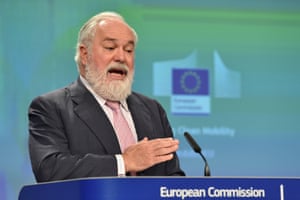Europe's carmakers face 30% emission cuts target
Nov 14, 2017

Miguel Arias Cañete, EU commissioner for climate action, said that it is time for Europe to re-invent the car. Photograph: Eric Vidal/ReutersNew proposals to limit CO2 from passenger cars and vans by 2030 would meet climate goals, but campaigners say regulations fall short
The European commission has unveiled new proposals for limits on carbon dioxide emissions from passenger cars and vans, which would compel manufacturers to cut emissions from their vehicles by nearly a third from 2030.
But the proposals will not require manufacturers to make a fixed quota of their fleet run on electricity, as some campaigners had hoped.
The commission said the new standards would help the bloc meet its targets on greenhouse gas reduction under the Paris agreement, and “put the EU back in the race” for global leadership on clean vehicle technology.
Miguel Arias Cañete, the EU commissioner for climate action, said: “Europe invented the car. And it had a good run: it modernised our economy and changed our society. But the car as we know is reaching its limits. It’s now time for Europeto re-invent it.”
He said the global race to develop clean cars was “an irreversible trend” and that the new proposals would help Europe to lead it. “We need the right measures and the right incentives.”
The announcement came as world governments met in Bonn, Germany, to discuss the implementation of the Paris agreement on climate change, including ways to raise countries’ emissions-cutting targets, which according to scientific advice are currently too low to protect the world from the likely effects of global warming.
The new emissions standards, if accepted, would apply to manufacturers’ entire fleets. This means that carmakers can continue to produce high-end petrol-guzzling machines, as long as they offset this with lower-emission vehicles, such as electric cars, at the other end of the scale.
Emissions from fleets of new passenger cars and new light commercial vehicles will have to be 30% lower in 2030 compared to 2021.
However, critics said these targets were too low, and that the commission had failed to learn the lessons from the diesel scandal. Ansgar Kiene, EU climate policy director at Greenpeace, said and entirely different approach was needed instead of seeking to make current technology somewhat more efficient: “These measures are fundamentally held back by the 20th century obsession with the passenger car and combustion engine. Cities and governments across Europe are way ahead of the game [for instance on restrictions on cars in city centres].”
Karima Delli, chairman of the European parliament’s transport committee, which will have a chance to discuss the proposals, said the commission had yielded to the lobbying of German industry, and that the regulations fell short of what is needed to meet the Paris agreement. “This gift to the automotive industry is poisoned, not only because it hinders modernisation – needed to ensure [the industry’s] long-term viability – but also because it delays the implementation of policies accompanying this conversion.”
She also condemned the commission for refusing to set tough standards requiring the manufacture of zero-emissions vehicles, such as electric cars. “By setting non-binding targets, the commission collects loopholes. It delays innovation and the development of electric vehicles.”
Transport and Environment, the umbrella group for NGOs in this area, also criticised the proposals. Greg Archer, clean vehicles director, said: “The commission has gifted the car industry an ineffective regulation after they came calling. Removing the penalty for failing to meet zero-emission vehicle targets is an own goal. It amounts to handing global leadership on electric cars to China, which will be delighted to export their models to Europe, jeopardising jobs.”
The commission has been mired in a controversy over whether it yielded to lobbying. Last month, the chief of staff to the commission president, Jean-Claude Juncker, denied claims he had instructed commissioners to drop sanctions that would punish carmakers for missing proposed electric vehicles. He was alleged to have done so after a call from the head of the powerful German auto manufacturers lobby. While admitting a call was made, the commission said it had been referred to the climate commissioner, Cañete.
On Wednesday in Brussels, Cañete said: “The obligation of the commission is to hear everybody, every stakeholder, and have a conversation with all. And then with full independence establish our own position. There are people who want more ambition – we shall see what happens in the parliament and the council [which also have a say on the proposals].”
Source: theguardian